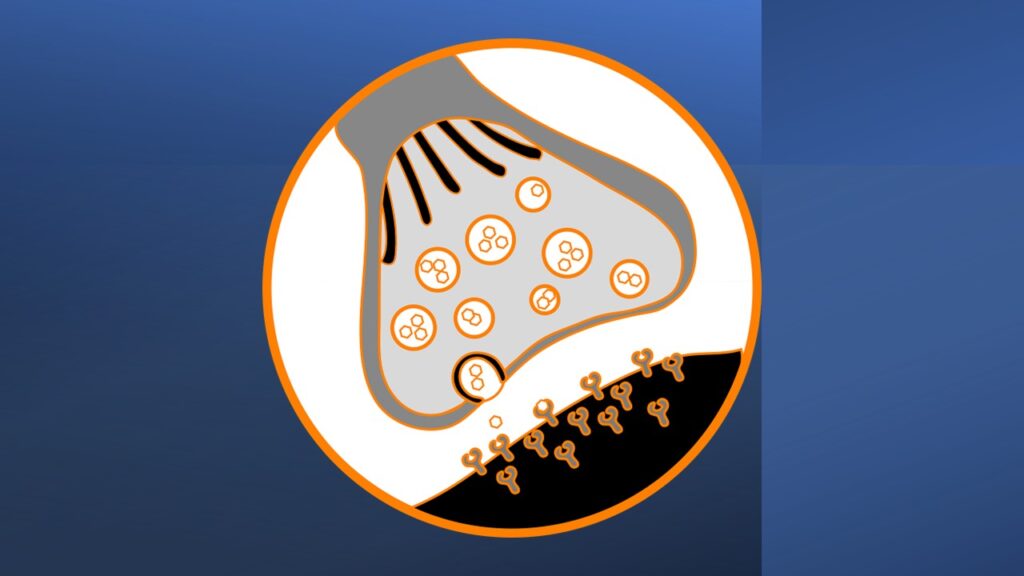
One of the core challenges faced by those with ADHD is maintaining attention and focus. While there are various factors contributing to this difficulty, the intricate interplay of neurotransmitters, particularly dopamine, in the brain holds a significant role. Below are some of the ways that dopamine and other neurotransmitters influence attention and focus in individuals with ADHD.
The Neurotransmitter Symphony
A neurotransmitter is a specialized chemical messenger in the brain and nervous system that helps transmit signals between nerve cells, or neurons. These chemical substances are essential for communication between neurons, enabling them to send and receive information. Neurotransmitters play a crucial role in various brain functions, including controlling emotions, regulating bodily functions, and facilitating cognitive processes such as learning, memory, and attention.
Different neurotransmitters have distinct functions and effects on the brain’s overall activity and behavior. Among these, dopamine takes center stage in understanding the mechanisms behind attention and focus. Dopamine is associated with the brain’s reward and pleasure systems, but its impact extends beyond mere enjoyment.
Dopamine and the Reward System
In individuals without ADHD, the release of dopamine is tightly linked to completing tasks or achieving goals. This ‘reward response’ reinforces positive behaviors and motivates individuals to stay focused. However, in people with ADHD, there appears to be an imbalance in the dopamine system. Research suggests that their brains might have lower levels of available dopamine or difficulties in effectively utilizing it, leading to challenges in maintaining sustained attention.
Dopamine’s Role in Sustained Attention
Sustained attention, or the ability to focus on a task for an extended period, is heavily reliant on dopamine. It acts as a sort of ‘fuel’ for the brain, helping to maintain interest and motivation. In individuals with ADHD, the brain’s dopamine pathways may be less responsive, making it harder for them to sustain attention without external stimuli. This is why individuals with ADHD often seek more stimulating environments or engage in impulsive behaviors; these actions temporarily boost dopamine levels and provide a short-lived sense of focus.
The Norepinephrine Connection
Another neurotransmitter, norepinephrine, also plays a crucial role in attention and focus. Norepinephrine helps regulate alertness and vigilance. Research suggests that norepinephrine levels are lower in individuals with ADHD, contributing to difficulties in maintaining sustained attention and staying alert. Medications commonly prescribed for ADHD, such as stimulants, work by increasing the availability of norepinephrine and dopamine, thus enhancing attention and focus.
GABA and Glutamate: Maintaining the Balance
While dopamine and norepinephrine grab the spotlight, other neurotransmitters like gamma-aminobutyric acid (GABA) and glutamate also play supporting roles. GABA, known as an inhibitory neurotransmitter, helps regulate brain activity and prevent overstimulation. Glutamate, an excitatory neurotransmitter, is involved in learning and memory. An imbalance between these neurotransmitters can lead to difficulties in filtering out irrelevant information and maintaining focus, both of which are common challenges in ADHD.
Understanding the role of neurotransmitters, especially dopamine, norepinephrine, GABA, and glutamate, provides crucial insights into the challenges faced by individuals with ADHD in maintaining attention and focus.
The delicate dance of these chemicals in the brain shapes our ability to engage with the world around us. While there is much to uncover about the intricate neurochemistry involved, ongoing research is shedding light on potential interventions that can help individuals with ADHD harness their focus and reach their full potential. Whether through medication, behavioral therapy, coaching or a combination of approaches, the aim is to create a symphony of neurotransmitters that supports sustained attention and allows individuals with ADHD to thrive.
References
- https://www.additudemag.com/adhd-neuroscience-101/
- https://psychcentral.com/adhd/neurotransmitters-involved-in-adhd
- https://www.healthline.com/health/adhd/adhd-dopamine
- https://www.verywellmind.com/the-adhd-brain-4129396
- https://edgefoundation.org/inside-the-adhd-brain/


